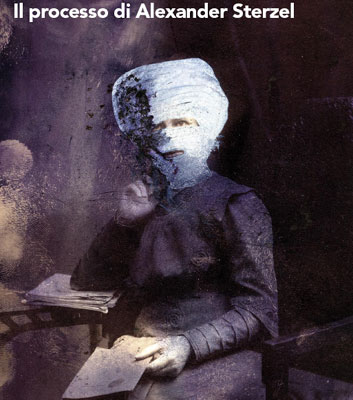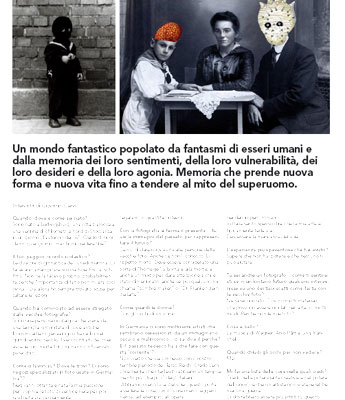| PIG MAGAZINE: Where when and how were you born?
ALEXANDER STERZEL: I was born in Ludwigsburg, a baroque influenced city some 20 kilometers north of Stuttgart, on an autumn day in 1967. I feel like remembering that day, but who would believe this anyway?
PIG MAGAZINE: Your worst memory at school?
ALEXANDER STERZEL: The 2 hours of sports on Monday mornings. We were asked to climb up a rope all the way to the ceiling. I didn't even make it on that rope, probably because the relevance of climbing a rope was not obvious to me. From then on I found excuses
to always miss the sports lectures.
PIG MAGAZINE: When did you started being fashineted by faded and old photos?
ALEXANDER STERZEL: I am a nostalgic person, coming from a family which was surrounded by antiques and nastalgica. Our family tree goes back to the 15th century. The old paintings of my ancestors and the many photographs of them seem to have influenced me a
lot.
PIG MAGAZINE: How do you operete on them? and where did you find them?
ALEXANDER STERZEL: During the eighties I discovered my preference to cover photos with black paint and partially remove that again. My intention was to invite the onlooker to try to look behind things. In other words, to dig for and consider and appreciate
all facets of life, not just those that are visible immediately. I buy most old photographs on flea markets and my friends give them as presents to me, in very generous amounts.
PIG MAGAZINE: Photography shots the present. do you use past images to represent the future?
ALEXANDER STERZEL: In principle I try to give new life to the persons on old photos. Although I do not know any of them, I have a lot of respect for them. It should be understood as a 'hommage' to life and death, and I pay attention to those who are most
likely forgotten elsewhere - evenaccepting that some ironically refer to me as a 'zombie-maker' or 'Dr. Frankenstein of the arts'.
PIG MAGAZINE: How do you watch women?
ALEXANDER STERZEL: Through the eyes of a man.
PIG MAGAZINE: In germany there are a lot of artist (of all kind of arts) that seem kinda obsessed with a gloomy and obscure imaginario. Any idea of the reason? Does the german past has an influence on this?
ALEXANDER STERZEL: I do not think that this is connected to our terrible period of the Third Reich. Germans seem to be more 'tragically tempered' than the Italians. We simply enjoy too little sunshine, which might result in looking at things less
light-heartedly. Compare for instance Italian and German opera. In the works of Bellini or Puccini you go through all the agony with the heroes and it breaks your heart. In a work from Richard Wagner the heroes die pretty fast. The German barbarians were always rougher than their cultivated and lively counterparts in
the Roman Empire. From Italy I heard quite often that my art is typical and purely German. It must be the lack of sun ...
PIG MAGAZINE: The most scary experience you had?
ALEXANDER STERZEL: To know, you are without power and helpless.
PIG MAGAZINE: You are a photographer too...how would you feel in finding out someone in the future is using your images the way you are doing it now with the old photos you use?
ALEXANDER STERZEL: I would feel honoured. There are enough raw materials for culture, which can be recycled in many ways. Why not my photos at some point in time?
PIG MAGAZINE: What is beautiful?
ALEXANDER STERZEL: The music of Wagner, Arvo Pärt and Giya Kancheli.
PIG MAGAZINE: When do you close your eyes to not see?
ALEXANDER STERZEL: Never.
PIG MAGAINE: Please list the things you belive in.
ALEXANDER STERZEL: I believe in the creative potential and power in mankind and that artists would never start a war against other people. There should be more artists on this planet. And we should allow ourselves to have and show feelings and emotions - our
own as well as the sympathy for the pains of others.
|
PIG MAGAZINE: Quando, dove e come sei nato? ALEXANDER STERZEL: Sono nato a Ludwigsburg, una città
barocca a una ventina di chilometri a nord di Stoccarda in un giorno d’autunno del ’67. Credo di ricordarmi quel giorno, ma chi mi crederebbe?
PIG MAGAZINE: Il tuo peggior ricordo scolastico?
ALEXANDER STERZEL: Le due ore di ginnastica del lunedì mattina. Ci facevano arrampicare su una fune fino al soffitto. Non ce la facevo proprio, probabilmente perché l’importanza di farlo non mi era così ovvia... Da allora ho sempre
trovato scuse per saltare le lezioni.
PIG MAGAZINE: Quando hai cominciato ad essere stregato dalle vecchie fotografie?
ALEXANDER STERZEL: Sono una persona nostalgica che viene da una famiglia circondata di cose antiche. Il nostro albero genealogico ha radici nel quindicesimo secolo. I vecchi ritratti dei miei avi e le loro molte foto mi hanno
influenzato parecchio.
PIG MAGAZINE: Come ci lavori su? Dove le trovi? Ci sono negozi specializzati in foto usate in Germania?
ALEXANDER STERZEL: Negli anni ottanta è nata la mia passione per coprire le foto di vernice nera per poi raschiarla via parzialmente.
Per invitare chi le avesse viste a guardare oltre le cose. In altre parole: a scavare, riscoprire e apprezzare tutte le sfumature della vita, non solo quelle più superficiali. Di solito le compro nei mercatini dell’usato e i miei amici me ne regalano in quantità notevoli.
PIG MAGAZINE: Con la fotografia si ferma il presente... tu usi le immagini del passato per rappresentare il futuro?
ALEXANDER STERZEL: Cerco di dare nuova vita alle persone delle vecchie foto. Anche se non li conosco. Li rispetto molto. Deve essere considerato una sorta di "homage" alla vita e alla morte; è anche un modo per dare attenzione a chi è
stato dimenticato, anche se poi qualcuno mi chiama "zombie-maker" o "Dr. Frankenstein dellarte".
PIG MAGAZINE: Come guardi le donne?
ALEXANDER STERZEL: Con gli occhi di un uomo.
PIG MAGAZINE: In Germania ci sono moltissimi artisti che sembrano ossessionati da un immaginario oscuro e malinconico... ci sai dire il perché? E il passato tedesco ha a che fare con questa ‘corrente’?
ALEXANDER STERZEL: Non credo che sia connesso con il nostro terribile periodo del Terzo Reich. Credo semplicemente che i tedeschi abbiano un tempramento più "tragico" degli italiani. Abbiamo meno luce del sole, questo porta a vedere le
cose con il cuore meno leggero. Pensa, ad esempio, all’opera. Nei lavori di Bellini o Puccini l’agonia degli eroi è "vissuta" dallo spettatore e ti spezza il cuore. Wagner invece fa morire gli eroi piuttosto velocemente. I barbari tedeschi erano sicuramente più duri e rozzi dei contemporanei dell’impero romano. In
Italia sento spesso dire che la mia arte è tipicamente tedesca. Dev’essere la mancanza del sole...
PIG MAGAZINE: L’esperienza più spaventosa che hai avuto?
ALEXANDER STERZEL: Sapere che non hai potere e che nessuno ti può aiutare.
PIG MAGAZINE: Tu sei anche un fotografo... come ti sentiresti se in un lontano futuro qualcuno intervenisse su uno dei tuoi scatti come fai tu con le vecchie foto?
ALEXANDER STERZEL: Ne sarei onorato. Ci sono molti materiali che possono essere riciclati nell’arte, in molti modi. Perché non le mie foto?
PIG MAGAZINE: Cosa è bello?
ALEXANDER STERZEL: La musica di Wagner, Arvo Pärt e Giya Kancheli.
PIG MAGAZINE: Quando chiudi gli occhi per non vedere?
ALEXANDER STERZEL: Mai.
PIG MAGAZINE: Mi fai una lista delle cose nelle quali credi?
ALEXANDER STERZEL: Credo nelle potenzialità creative e nel potere dell’uomo; e che un artista non scatenerebbe mai una guerra. Ci dovrebbero essere più artisti su questo pianeta. E tutti dovremmo permetterci di mostrare i nostri sentimenti e
le nostre emozioni – e la compassione per il dolore degli altri.
|



